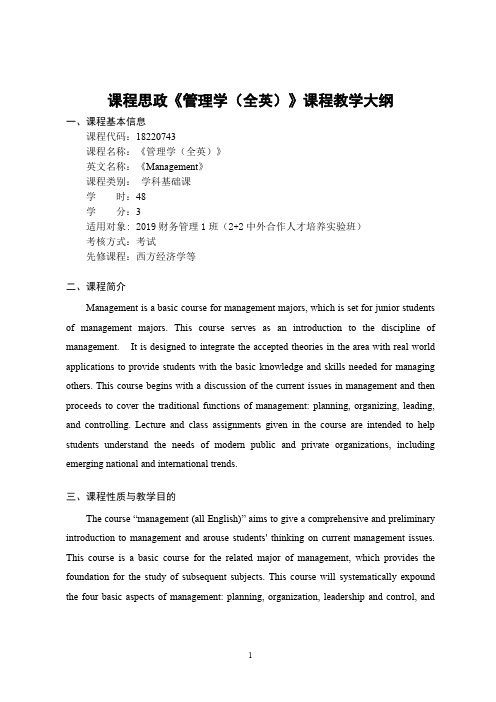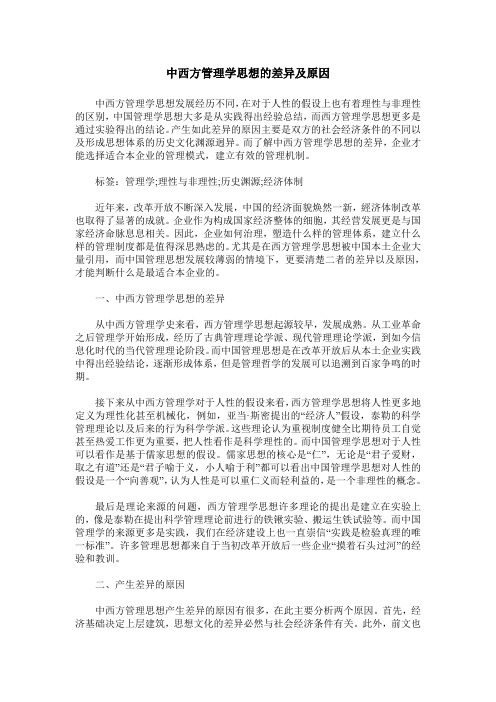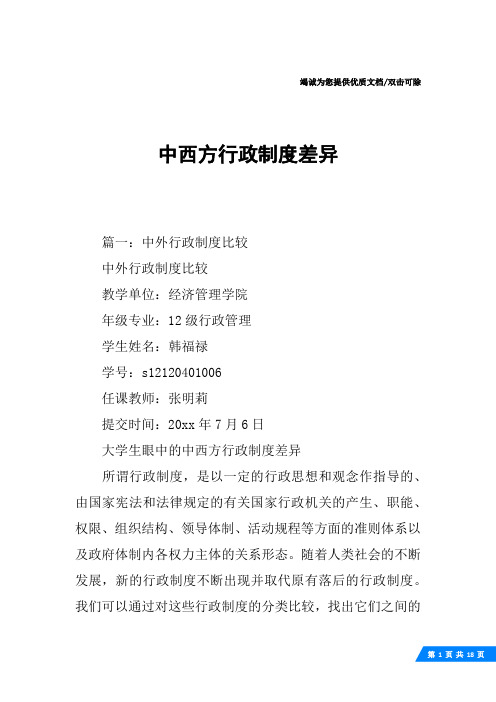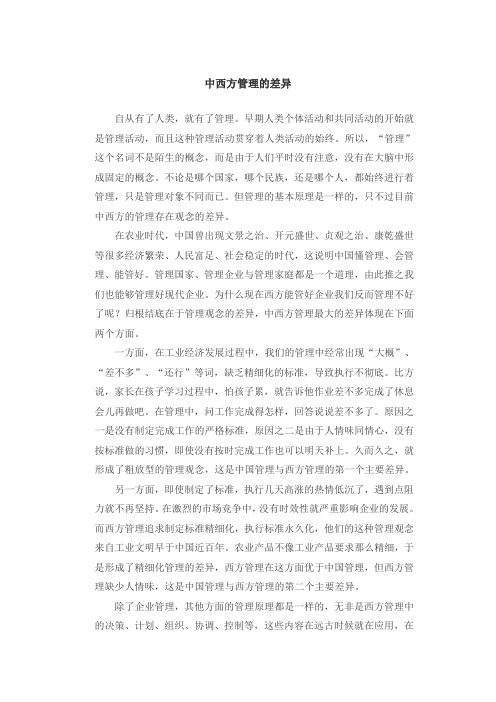中西方管理差异(全英文)
《管理学(全英)》-课程教学大纲

课程思政《管理学(全英)》课程教学大纲一、课程基本信息课程代码:18220743课程名称:《管理学(全英)》英文名称:《Management》课程类别:学科基础课学时:48学分:3适用对象:2019财务管理1班(2+2中外合作人才培养实验班)考核方式:考试先修课程:西方经济学等二、课程简介Management is a basic course for management majors,which is set for junior students of management majors.This course serves as an introduction to the discipline of management.It is designed to integrate the accepted theories in the area with real world applications to provide students with the basic knowledge and skills needed for managing others.This course begins with a discussion of the current issues in management and then proceeds to cover the traditional functions of management:planning,organizing,leading, and controlling.Lecture and class assignments given in the course are intended to help students understand the needs of modern public and private organizations,including emerging national and international trends.三、课程性质与教学目的The course“management(all English)”aims to give a comprehensive and preliminary introduction to management and arouse students'thinking on current management issues. This course is a basic course for the related major of management,which provides the foundation for the study of subsequent subjects.This course will systematically expound the four basic aspects of management:planning,organization,leadership and control,andwill try to apply the theory into case analysis under the guidance of teachers.At the end of the course,students should be able to analyze problems in the management field from a more professional perspective and master common technical terms in the field.Due to the basic course of management,the study of this course also lays a foundation for the subsequent study of related courses,such as strategic management,human resource management,e-commerce,organizational behavior,etc.This course uses English textbooks and the classroom language is English.Therefore,it has a higher requirement for the teaching object.Students should generally have a high level of English,and have strong oral English ability.Through the study of this course,four teaching objectives can be achieved:1.The construction of management knowledge system:to enable students to master thebasic concepts and connotations of management,various management theories, knowledge construction and curriculum system construction.2.The improvement of various skills:to enable students to think and analyze themanagement phenomenon in today's business environment with all kinds of knowledge, and break through traditional knowledge to achieve thinking innovation.3.The improvement of English listening,speaking,reading and writing ability:as thiscourse is an all-English teaching form,it will have requirements on students'English skills in all aspects.4.The strengthening of ideological and political education:to enable students tocomprehensively and objectively understand contemporary China and look at the outside world,be good at distinguishing right from wrong,and form a stand,viewpoint and method for observing and understanding contemporary world and contemporary China.四、教学内容及要求Chapter1The introduction of management:history,concepts and framework Chapter main Contents:1.Tell who managers are?2.What three characteristics do all organizations share?3.What’s the definition of management?4.Make comparison between managers and non-managerial employees.5.Three ways to look at what managers do.6.Explain why it’s important to study management.7.Describe the factors that are reshaping and redefining management.8.Scientific Management,General Administrative Theory,Behavioral Approach,Systems Approach.Chapter Objectives:Emphasis:1.Understand three Common Characteristics of Organizations.2.what’s the difference between Managers and non-managerial Employees?Difficulties:what does a manager do?Elements of ideological and political education:patriotismChapter Assignments:Please list at least three kinds of job titles in modern company and attribute these titles to four management levels.Chapter2The management environment analyses and applicationChapter main Contents:1.Explain what the external environment is and why it’s important?2.Discuss how the external environment affects managers?3.Define what organizational culture is?4.Describing the dimensions of organizational culture.5.How organizational culture affects managers?Chapter Objectives:Emphasis:what does external environment include?And how these factors affect the management?Difficulties:know the organizational culture?And how to evaluate an organization’s culture?Elements of ideological and political education:an international visionChapter Assignments:Please select one industry you are interested in and make the analyses about it’s external environment?Chapter3Integrative managerial issuesChapter main Contents:1.How to understand the concept of“globalization”and its reflection.2.What’s the influence of globalization on organizations?3.How organizations go global?And what are the different types of globalorganizations?4.What managers need to know about the management in global business?5.Discuss how society’s expectations are influencing managers and organizations.6.Discuss the factors that lead to ethical and unethical behavior in organizations.7.Describe how the workforce is changing and its impact on the way organizations aremanaged.Chapter Objectives:Emphasis:1.The meaning of globalization and it’s effect on management2.the diversity of workforceDifficulties:understanding the effect of firm globalization on company management.Elements of ideological and political education:an holistic viewChapter Assignments:Please conclude the effects of globalization effects on company management.Chapter4Foundation of decision makingChapter main Contents:1.Describe the decision-making process and some points about every step.2.What common errors are committed in the decision-making process?(12commondecision errors)3.Explain the three approaches managers can use to make decisions.4.Describe the types of decisions and decision-making conditions managers face.5.Discuss group decision-making,knowing the advantage and disadvantage of groupdecision making.6.When are groups most effective?7.Discuss contemporary issues in managerial decision making(national culture,creativity and design thinking,big data)Chapter Objectives:Emphasis:The three levels of analysis in the OB model.Difficulties:The need for a contingency approach to the study of OB.Elements of ideological and political education:socialism with Chinese characteristicsChapter Assignments:Think over whether you have made some errors in decision making?What’s it?Chapter5Foundation of planningChapter main Contents:1.Discuss the nature and purposes of planning?2.Since changing is ever-stopping,is the formal planning necessary?3.Explain what strategic includes and what managers do in the strategic managementprocess?4.What strategies do mangers use?pare approaches to goal setting and planning.6.How do managers set goals and develop plans?7.What contemporary issues in planning do managers face?Chapter Objectives:Emphasis:1.The company strategy system2.The content of MBO3.The steps and methods of goal-settingDifficulties:1.The essence of MBO2.The company strategy systemElements of ideological and political education:confidence in our path,in our theoriesChapter Assignments:If“The don’t change thing is change itself”is the real fact,what’s the meaning of planning?Chapter6Organizational structure and designChapter main Contents:1.What are the six key elements in organizational design?(specialization,departmentalization,authority,span of control,centralization,formalization)2.Identify the contingency factors that favor either the mechanistic model or theorganic model of organizational design.pare traditional and contemporary organizational designs.4.Discuss the design challenges faced by today’s organizations.(keep employeesconnected,global difference,building a learning organization,flexible workarrangement and so on)Chapter Objectives:Emphasis:The six key elements in organizational design.Difficulties:The design challenges faced by today’s organizations.Elements of ideological and political education:confidence in our systemChapter Assignments:Do you think the traditional hierarchical structure still have life today? Chapter7Managing human resourcesChapter main Contents:1.Describe the key components of the human resource management process andthe important influences on that process.2.What’s employment planning?And what’s the two steps of it?3.How do organizations recruit employees?And how to handle layoffs?4.How do managers select competent employees?5.What is employees are provided with needed skills and knowledge?6.Describe strategies for retaining competent,high-performing employees.7.Discuss contemporary issues in managing human resources.Chapter Objectives:Emphasis:1.The process of human resource management;2.How to compensate the employees;3.How to retain competent,high-performing employees.Difficulties:Grasping the process of HRM and how to match the job requirements and employee?Elements of ideological and political education:China’s national conditionChapter Assignments:How to retain the90s and00s employees?Chapter8Managing change and innovationChapter main Contents:1.Define organizational change and the categories of organizational change.2.what forces lead to organizations make change?pare the change process.(CALM WATERS VS.WHITE-WATERMETAPHOR)4.what forces resist the organization change?5.Explain how to manage resistance to change?6.What managers need to know about employee stress?7.Discuss techniques for stimulating innovation.Emphasis:1.What’s organizational change are companies confronted with?2.What can the companies do to eliminate the employees’stress?3.How to create innovation?Difficulties:What can companies do to make the organization more creative?Elements of ideological and political education:a sense of prideChapter Assignments:1.What method do you know about prompting one more creative?2.Do you have some method to decrease the stress?Chapter9Group and managing work teamsChapter main Contents:1.What’s the definition of group and what are the stages of group development?2.Describe the five major concepts of group behavior.(roles,norms andconformity,status systems,group size,group cohesiveness)3.How groups are turned into effective teams?From context,composition,workdesign and process perspectives.4.What contemporary issues do managers face in managing teams?(managingglobal team,)Chapter Objectives:Emphasis:1.how to build an effective work team?2.what issues does a manager must confronted with in new environments?Difficulties:How to build an effective work team?Elements of ideological and political education:organization confidenceChapter Assignments:Do you want to work in team or work individually?Why?Chapter10Motivating and rewardingChapter main Contents:1.Define and explain motivation and what’s three elements of motivation?pare four early theories of motivation(Maslow’s Hierarchy of NeedsTheory,X-Y Theory,Two-Factor Theory,McClelland’s Three-needs Theory)3.What’s goal-setting theory?4.How does job design influence motivation?5.What’s equity theory?6.What current issues do managers face in motivating employees?Chapter Objectives:Emphasis:Compare and integrate the classical and modern motivation theoryDifficulties:How to apply these motivation theories to realities?Elements of ideological and political education:responsibilityChapter Assignments:What factors can motivate you working harder?Chapter11Leadership and trustChapter main Contents:1.Who is leader and what is leadership?2.What traits do leaders have according trait theory?3.What behaviors do leaders exhibit?4.Describe the four major contingency leadership theories.5.Describe modern views of leadership and the issues facing today’s leaders.6.Why trust is the essence of leadership?Chapter Objectives:Emphasis:How to understand the contingency leadership theory?Difficulties:How to understand the essence role of trust in leadership?Elements of ideological and political education:integrity and honestyChapter Assignments:Imaging you are a leader,what do you want to do to build the trust relationship with employees?Chapter12Managing communication and informationChapter main Contents:1.Describe what managers need to know about communicating effectively.2.Explain how technology affects managerial communication.3.Discuss contemporary issues in communication.Chapter Objectives:Emphasis:1.What’s the process of communication?paring written communications and verbal communication.3.Which factors will lead to the ineffectiveness in communication?4.How to enhance the communication effect?5.Understanding the effects of some technology on managing communication.6.What communication issues do managers face today?Difficulties:How to tackle the resistance when communication?Elements of ideological and political education:development and innovationChapter Assignments:Please recall the last low-efficient communication case in your daily life and analyze the reason.Chapter13Foundation of controlChapter main Contents:1.What is control and why control is important?2.Describe the three steps in the control process.(get measuring,compare actualperformance to planned goals,take actions)3.When does control take place?4.Discuss the types of controls organizations and managers use.5.What contemporary control issues do managers confront?Chapter Objectives:Emphasis:Grasp three kinds of control.Difficulties:When does control take place?Elements of ideological and political education:ideal and faithChapter Assignments:Which method do you think is most effective when controlling?why?五、各教学环节学时分配Presentation and debate033 Chapter9Group and managing work teams33 Chapter10Motivating and rewarding(I)33 Chapter10Motivating and rewarding(II)213 Chapter11Leadership and trust33 Chapter12Managing communication and213 informationChapter13Foundation of control33 Review and answering033六、推荐教材和教学参考资源1、《21世纪的管理挑战》,彼得.德鲁克著2、《创新者的窘境》&《创新者的解答》,克莱顿•克里斯坦森著3、《竞争战略》迈克尔.波特著4、《影响力》罗伯特.西奥迪尼著5、《定位》艾·里斯,杰克·特劳特著6、《商战》杰克•特劳特/阿尔•里斯著7、《联盟:互联网时代的人才变革》里德·霍夫曼著8、《重新定义管理》布赖恩·罗伯逊著七、其他说明大纲修订人:田野修订日期:2020/12/10大纲审定人:赵明审定日期:2020/12/16。
中美差异英文作文

中美差异英文作文英文:When it comes to the differences between China and the United States, there are many aspects to consider. In terms of culture, the two countries have very different values and customs. For example, in China, filial piety is highly valued, while in the United States, individualism is emphasized. This can be seen in the way families are structured, with many Chinese families living in multi-generational households, while American families tend to be more nuclear.Another difference is in the way education is approached. In China, there is a strong emphasis on academic achievement and success, with students often studying long hours and participating in extracurricular activities to build their resumes. In the United States, there is more of a focus on a well-rounded education, with students encouraged to explore different subjects andpursue their passions.In terms of business, the two countries also have different approaches. In China, relationships and connections are very important, with many deals being made through personal connections rather than formal contracts. In the United States, contracts and legal agreements are the norm, with a focus on protecting individual rights and interests.Overall, the differences between China and the United States are vast and complex, and cannot be fully capturedin just a few examples. However, by understanding and appreciating these differences, we can build stronger relationships and work towards a more interconnected world.中文:谈到中美之间的差异,有很多方面需要考虑。
中西方管理学思想的差异及原因

中西方管理学思想的差异及原因中西方管理学思想发展经历不同,在对于人性的假设上也有着理性与非理性的区别,中国管理学思想大多是从实践得出经验总结,而西方管理学思想更多是通过实验得出的结论。
产生如此差异的原因主要是双方的社会经济条件的不同以及形成思想体系的历史文化渊源迥异。
而了解中西方管理学思想的差异,企业才能选择适合本企业的管理模式,建立有效的管理机制。
标签:管理学;理性与非理性;历史渊源;经济体制近年来,改革开放不断深入发展,中国的经济面貌焕然一新,經济体制改革也取得了显著的成就。
企业作为构成国家经济整体的细胞,其经营发展更是与国家经济命脉息息相关。
因此,企业如何治理,塑造什么样的管理体系,建立什么样的管理制度都是值得深思熟虑的。
尤其是在西方管理学思想被中国本土企业大量引用,而中国管理思想发展较薄弱的情境下,更要清楚二者的差异以及原因,才能判断什么是最适合本企业的。
一、中西方管理学思想的差异从中西方管理学史来看,西方管理学思想起源较早,发展成熟。
从工业革命之后管理学开始形成,经历了古典管理理论学派、现代管理理论学派,到如今信息化时代的当代管理理论阶段。
而中国管理思想是在改革开放后从本土企业实践中得出经验结论,逐渐形成体系,但是管理哲学的发展可以追溯到百家争鸣的时期。
接下来从中西方管理学对于人性的假设来看,西方管理学思想将人性更多地定义为理性化甚至机械化,例如,亚当·斯密提出的“经济人”假设,泰勒的科学管理理论以及后来的行为科学学派。
这些理论认为重视制度健全比期待员工自觉甚至热爱工作更为重要,把人性看作是科学理性的。
而中国管理学思想对于人性可以看作是基于儒家思想的假设。
儒家思想的核心是“仁”,无论是“君子爱财,取之有道”还是“君子喻于义,小人喻于利”都可以看出中国管理学思想对人性的假设是一个“向善观”,认为人性是可以重仁义而轻利益的,是一个非理性的概念。
最后是理论来源的问题,西方管理学思想许多理论的提出是建立在实验上的,像是泰勒在提出科学管理理论前进行的铁锹实验、搬运生铁试验等。
中西方管理学差异

中西方管理差异管理思想主要有两种类型:一种是渊源于古希腊文化传统的西方管理思想,它在近代资本主义的条件下演变为具有一定科学形态的管理理论,从20世纪初泰勒开始已发展成为科学化的理论体系,对现代人类的经济社会发展产生了重大影响;另一种是渊源于中华文化传统的中国管理思想,它具有鲜明的东方文化色彩。
但由于社会历史条件的限制,中国管理思想在近代没有能够与产业革命及资本主义企业经营相结合,以至今天一般人认为科学管理的观念和方法都来自西方。
直到上个世纪80年代,由于日本及“亚洲四小龙”经济的飞速发展,才使人们的眼光重新从西方转向东方,开始研究中国古代管理思想在当代社会中的重大意义随着改革开放的由浅入深,国内的企业管理者现在每天都可以接触到一些国外企业最先采用或者已经在国外经过验证的先进理论,像“管理者的第五项修炼、蓝海战略、ISO认证、六西格玛管理、平衡记分卡、E—HR、XYZ激励理论“等等,各种研讨会学习班多如牛毛。
但是,这些理论真的是放之四海而皆准吗?确实适合处于不同企业发展阶段的中国企业吗?中国员工在思维方式和工作习惯上真的和国外员工一致吗?对于企业来说,是先进的理论更重要还是适合的匹配更关键?因为中国人、中国企业确实有自己不同的特点,做管理而不因地制宜就是胡搞。
来看一看中国式管理的大师曾老师是怎么讲的,我喜欢案例说话,光讲理论唬人不是我的管理风格!1、人性中国人不像美国人,美国人很简单:“我给你多少钱,你听我的话工作。
”日本人韩国人很容忍,只要“比比谁比较大”:“我比你年资高,你听我的;你比我年资高,我听你的。
”这种“上级生/前辈”精神,成为他们的行动准则。
中国人就比较复杂,你说“我年资比你高”,有些人会说“公司就是被你害死的”;你说“我的能力比你强”,他又说“老板给你工作机会,他不给我,给我做,我做得比你好。
”假如人家给你钱,你会不会像西方人那样说:“噢,我最喜欢这个!”再比如你送西方人礼物,他会说:“啊!我好喜欢!”然后当众打开。
中西方行政制度差异

竭诚为您提供优质文档/双击可除中西方行政制度差异篇一:中外行政制度比较中外行政制度比较教学单位:经济管理学院年级专业:12级行政管理学生姓名:韩福禄学号:s12120401006任课教师:张明莉提交时间:20xx年7月6日大学生眼中的中西方行政制度差异所谓行政制度,是以一定的行政思想和观念作指导的、由国家宪法和法律规定的有关国家行政机关的产生、职能、权限、组织结构、领导体制、活动规程等方面的准则体系以及政府体制内各权力主体的关系形态。
随着人类社会的不断发展,新的行政制度不断出现并取代原有落后的行政制度。
我们可以通过对这些行政制度的分类比较,找出它们之间的共同特征和本质区别,有助于我们了解行政制度建设实践中的经验和教训,以便在我国行政制度改革的过程中趋利避害,取长补短。
“行政制度”又被称为“政府制度”,其应主要取决于国家权力机关的组织形式、行使国家权力人员的产生方式和国家权力机关之间的关系。
根据国家元首、立法机关与行政机关的关系以及政府组织形式上的特征,可以把政府制度划分为五种类型,即内阁制政府制度、总统制政府制度、半总统制政府制度、委员会制政府制度和人民民主制政府制度。
内阁制政府制度,亦称议会制政府制度或责任内阁制政府制度或议会内阁制政府制度。
它是西方国家及其他国家由内阁(政府)总揽行政权力并向议会负责的一种政府制度。
以英国为代表的内阁制政府制度具有以下主要特征:强调议会至上、内阁组成独特、国家元首“虚位”、内阁总揽行政权力、政府对议会负责。
总统制政府制度是由总统担任国家元首和政府首脑的一种政府制度。
大而言之,以美国为代表的总统制政府制度具有以下主要特征:总统独立于国会之外、总统一人兼任国家元首和政府首脑、政府与国会完全分离、政府成员与总统是僚属关系、政府不对国会负连带责任。
半总统制政府制度是一种介于总统制政府制度与内阁制政府制度之间、兼有内阁制特点的总统制政府制度。
大致说来,以法国为代表的半总统制政府制度具有以下主要特征:形式上设有两名行政首脑(总统和总理)、政府不对总统负责而对议会负责、总统掌握实际的统治权,成为国家的权力中心。
中西方管理的差异

中西方管理的差异自从有了人类,就有了管理。
早期人类个体活动和共同活动的开始就是管理活动,而且这种管理活动贯穿着人类活动的始终。
所以,“管理”这个名词不是陌生的概念,而是由于人们平时没有注意,没有在大脑中形成固定的概念。
不论是哪个国家,哪个民族,还是哪个人,都始终进行着管理,只是管理对象不同而已。
但管理的基本原理是一样的,只不过目前中西方的管理存在观念的差异。
在农业时代,中国曾出现文景之治、开元盛世、贞观之治、康乾盛世等很多经济繁荣、人民富足、社会稳定的时代,这说明中国懂管理、会管理、能管好。
管理国家、管理企业与管理家庭都是一个道理,由此推之我们也能够管理好现代企业。
为什么现在西方能管好企业我们反而管理不好了呢?归根结底在于管理观念的差异,中西方管理最大的差异体现在下面两个方面。
一方面,在工业经济发展过程中,我们的管理中经常出现“大概”、“差不多”、“还行”等词,缺乏精细化的标准,导致执行不彻底。
比方说,家长在孩子学习过程中,怕孩子累,就告诉他作业差不多完成了休息会儿再做吧。
在管理中,问工作完成得怎样,回答说说差不多了。
原因之一是没有制定完成工作的严格标准,原因之二是由于人情味同情心,没有按标准做的习惯,即使没有按时完成工作也可以明天补上。
久而久之,就形成了粗放型的管理观念,这是中国管理与西方管理的第一个主要差异。
另一方面,即使制定了标准,执行几天高涨的热情低沉了,遇到点阻力就不再坚持。
在激烈的市场竞争中,没有时效性就严重影响企业的发展。
而西方管理追求制定标准精细化,执行标准永久化,他们的这种管理观念来自工业文明早于中国近百年。
农业产品不像工业产品要求那么精细,于是形成了精细化管理的差异,西方管理在这方面优于中国管理,但西方管理缺少人情味,这是中国管理与西方管理的第二个主要差异。
除了企业管理,其他方面的管理原理都是一样的,无非是西方管理中的决策、计划、组织、协调、控制等,这些内容在远古时候就在应用,在我国古代已经发挥得淋漓尽致,但是现代我们没有很好地应用。
对中西方管理思想差异的分析
对中西方管理思想差异的分析集团文件发布号:(9816-UATWW-MWUB-WUNN-INNUL-DQQTY-对中西方管理思想差异的分析摘要:随着中国经济与世界经济的日趋一体化,跨文化管理亦日益成为中国理论界和企业界必须面对的一个重要课题。
因此,探究导致东西方企业管理差异的文化原因,有利于人们深入认识不同文化背景下的企业管理特征,从而更好地迎接世界性的跨文化管理的挑战。
Abstract: with the development of Chinese economy and world economy globalization, cross-cultural management has also become Chinese theoretical circles and enterprises must face an important issue. Therefore, research led to the East-West cultural differences cause of enterprise management, is helpful for people to understand the different cultural background of the enterprise management features, so as to better meet the world's cross-cultural management challenge.关键词:中西方管理思想;管理思想;差异Key words: Chinese and Western management thoughts; management idea; difference管理是文化的结晶,特定的管理思想是寓于特定的文化传统中,并受特定的文化传统支配和影响,从而带有特定文化传统的特征和烙印。
中西方人力资源管理差异浅析
中西方人力资源管理差异浅析摘要:由于文化根源、社会基础、企业实践的不同,导致中西方人力资源管理的实践效果有所不同。
本文从社会文化差异、社会人力资源差异以及企业人力资源差异等角度进行综合分析,以提高中国企业的人力資源管理水平。
并对我国人力资源管理发展进行展望,在实践中建立具有中国特色先进的人力资源管理模式。
关键词:人力资源管理我国从20世纪80年代开始从西方引进人力资源管理(Management of Human Resource)的理念,经过20多年的发展和融合,虽然在管理理念、管理方法和管理工具上已经基本和西方处于同等的水平,但是在管理的实际效果却仍和西方有所差距。
存在这种差距的根本原因在于中西方人力资源管理在文化根源、社会基础、企业实践中存在着较大的差异。
1.影响人力资源管理的中西方管理思想和文化差异在我国,儒家和道法的思想源远流长,强调“己所不欲、勿施于人”以及“天人合一”和“道法自然”,注重在仁、义和礼基础上形成的集体主义。
强调做任何事情的时候都要考虑到别人,不能仅做想做的事,应做该做的事,也要考虑自身情况做能做的事,从而在团队当中实现自我。
因此中国处理不平等的办法是效法自然,靠人的自觉和自律,用伦理这种无形的东西来规范社会的运行。
而人之所以可以自觉和自律,是由于伦理、礼、仪是符合自然规律的,是顺天应人的。
而且中国人传统价值观的目的只有一个,就是修身——修身是通过入世践行的方式来完成,而工作和事业只是帮助修炼自己的方式。
在西方,以卢梭、孟德斯鸠等为代表人物的启蒙运动推进了人性解放,资产阶级革命使自由、平等、博爱的理念深入人心。
随着资本主义制度的建立,人们逐渐发现资本主义社会并非当初宣扬的那样完美。
一批空想社会主义者,如圣西门、傅立叶、欧文等从道德和人性的角度对资本主义经济和社会形态进行了深刻的批判,推动了从人道的角度提出解决方案。
形成了现代西方人力资源管理思想的根源——从人道的角度发现不合理因素,从人道的角度解决问题。
中西方管理比较(二)
引言概述:本文旨在比较中西方管理方式的不同之处,并探讨其对组织绩效和员工发展的影响。
在全球化的时代,了解不同管理方式的优劣,可以帮助组织更好地适应和应对不同的文化背景,实现管理的国际化。
本文将涵盖五个大点:领导风格、决策制定、组织结构、员工关系和沟通方式。
正文内容:一、领导风格:1.中方:中方管理普遍倾向于集权和威权,以传统的“为人上”和“为人君”的理念为基础。
领导者通常以强势和权威的方式指导员工,并在组织中扮演重要的角色。
2.西方:西方管理更倾向于民主和参与性领导风格。
领导者更注重打造一个平等和开放的工作环境,鼓励员工的参与和合作。
他们更倾向于启发和授权员工,培养其创造力和自主性。
二、决策制定:1.中方:在中方管理中,决策通常由高层领导层集中做出,下层员工少有参与。
这是基于对领导者智慧和决策权的强烈信任。
这种集中制决策方式可以提高决策的效率,但会降低员工的主动性和创造力。
2.西方:与中方不同,西方管理更注重团队和员工的参与决策。
他们鼓励员工主动提出意见和建议,并通过开放的环境促进创新和团队合作。
这种分散式决策制定方式可以激发员工的积极参与,但可能会因为决策时间过长而降低效率。
三、组织结构:1.中方:中方组织结构通常呈现出层级清晰、权责明确的特点。
组织内部的沟通和信息流通主要通过层级之间的直接反馈来实现。
这种结构可以提供明确的指导和控制,但可能会限制信息的传递和创新的出现。
2.西方:西方组织结构通常更为扁平化,员工在组织中的地位更平等。
沟通和信息流通更加快速和开放,通过跨部门的合作和信息共享来加强组织内部的协调和创新。
这种结构可以促进组织的灵活性和创新,但可能会面临管理复杂性的挑战。
四、员工关系:1.中方:在中方管理中,员工与组织的关系通常较为形式化和层级化。
员工对领导者的权威和决策权有着较高的依赖和尊重。
组织通过提供稳定的工作环境和福利待遇来维护员工的忠诚度和工作动力。
2.西方:西方管理更注重员工的参与和个体发展。
中西方管理思想的比较分析
道德为先
中国管理思想认为道德是管理的 基础和核心,强调个人的道德修 养和企业的道德建设,认为只有 具备高尚的道德品质才能做好管
理。
综合思维
中国管理思想注重综合思维,强 调整体观念和系统思维,注重从 全局和整体角度看待问题,强调
各方面的协调和平衡。
西方管理思想概述
效率优先
西方管理思想注重效率,认为效率是管理的核心和基础, 强调以科学的方法和先进的技术提高效率,以达到企业的 目标和实现最大利润。
文化背景:中国管理思想源于中华文 化,注重和谐、整体性和集体主义, 而西方管理思想源于西方文化,注重 竞争、个性和自由主义。
决策方式:中国管理思想注重集体决 策、协商一致,而西方管理思想注重 个人决策、快速决策。
中西方管理思想的融合与发展
融合点
学习借鉴:中西方管理思想可以相互学习借 鉴,中国可以学习西方的制度管理和决策方 式,西方可以学习中国的文化背景和人际关 系处理方式。
关系、重视孝道等。
02
道家管理思想
道家主张无为而治,强调自然、和谐、创新和变革。在中国企业管理中
,道家思想也被广泛应用,如强调创新思维、追求灵活多变、注重生态
环境等。
03
法家管理思想
法家主张以法治国,强调制度、规范和惩罚,主张建立严格的法律制度
。在中国企业管理中,法家思想也有一定的应用,如强调制度建设、注
西方管理思想对企业 的借鉴意义
西方现代管理理论中的科学决策 、优化资源配置以及创新思维等 思想,有助于企业提高运营效率 、应对市场变化以及推动创新发 展等方面。
中西方管理思想的融 合与创新
中西方管理思想的融合将推动管 理学界的创新和发展,为全球范 围内的企业提供更全面、多元化 的管理智慧和解决方案。
- 1、下载文档前请自行甄别文档内容的完整性,平台不提供额外的编辑、内容补充、找答案等附加服务。
- 2、"仅部分预览"的文档,不可在线预览部分如存在完整性等问题,可反馈申请退款(可完整预览的文档不适用该条件!)。
- 3、如文档侵犯您的权益,请联系客服反馈,我们会尽快为您处理(人工客服工作时间:9:00-18:30)。
---------------------------------------------装--------------------------------- --------- 订 -----------------------------------------线----------------------------------------
课程
商务英语
2011 -2012 学年第 1 学期
成绩
评阅人
评语:
பைடு நூலகம்
姓名
学号
==========================================
(题目)
Differences between Chinese and western management
(正文)
[Abstract] Nowadays, in Chinese universities, more and more college students pursue
to foreign company. In the foreign enterprise, it can’t be avoided to work under the management in western-type.In order to have development in the foreign enterprise, differences between Chinese and western management should be acknowledged. This article selects three keys: the management basis points, management mode, management value orientation to analysis the causes of the formation of differences between Chinese and western management, and compare the advantages and disadvantages of each other. [Key words] Differences between Chinese and western management Management way Management value orientation
2
do habit, even if not finish the work can also be up tomorrow. Over the years, it has become extensive management ideas, it is China's management and the western management the first major differences. Three, management value orientation is different The stand or fall of the Chinese management motivation as the starting point of the quality evaluation management is the heavy righteousness; The effect of the western management judged as the starting point of the quality evaluation management, ChongLi.From the history of management, in the management of the evaluation standard, advocated by Chinese and western motives for evaluation according to that effect with behavior and for evaluation of thinkers have according to many. But from traditional management practice, the Chinese people are more likely to come from good motivation evaluation management behavior, if correct motive, even if the effect not beautiful also can accept. If, on the other hand, motivation not beautiful, even if the result is good. However, it is to criticism, because the starting point that is wrong. This kind of phenomenon is and China "valuing". Advocates of valuing, the first after righteousness, forgotting against. If confucius clearly put "unjust and rich and expensive to me as the floating clouds" proposition, he also said, "a gentleman YuYuYi yu, SIMS would do more harm than good". Will "for the" or "righteous" as the only difference between a little and value standard. And that's also deal with the relationship between the concept of basic principle is: "the first and then the righteous and the first and then righteousness is shameful". In this concept of the conclusion of the cause, under management in China on a more emphasis on value evaluation moral values and despise the utility value, to make the economy operation and management operation always subject to the requirements of ethics. In contrast, the western society will pay more attention to effect as a measure of management. The standard of value, this and westerners pragmatic and utility of traditional culture is not divided. Western-type,or the top-down,management emphasizes efficiency,and competition among workers, while the Chinese-type management gives priority to careful planning and encourages cooperation among workers, and between workers and the management. Thus, while the western-type mangement gives workers a joy of participation and fulfillment, and a sense of pride in their work.
To maintain the social structure stability, you must have a high above, all the king's landing the centralization management system has. This management system on social harmony, frequent avoid disputes; emphasize the overall effect, ignore the individual interests; Emphasize strictly consistent, killing personality differences. Reflected in the price management value target is to the pursuit of collectivism. Relative to character, the western countries into the industrial production order. Secondly, the management way China in the human nature management and good premise supposition, in management way in emphasis the use of "tao" guide; And the western management to human nature this evil for the hypothesis, in management way in emphasis is to use "art" Norms. For the understanding of human nature is management foundation, the different cultural background to be derived from different people sex understanding, is the cornerstone of a management theory knowledge. In the industrial economic development process, we often appear in the management of "probably", "almost", "still line" word, lack of intensification of standard, lead to implement thoroughly. For example, parents in the child in the learning process, afraid of children tired, then told him it's almost finished work have a rest to do it. In management, ask how work was completed, answer about almost. One of the reasons is not finish the work for the strict standard, second reason is because the human sympathy, not by a standard
